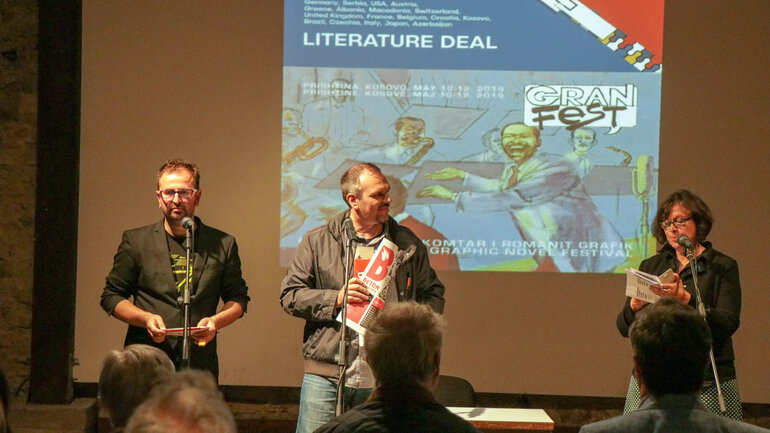“From Belgrade and Pristina, with love”

Although the Kosovo War ended 20 years ago on 10 June 1999, dealing with the past continues to be a challenging process throughout the former Yugoslavia. Nevertheless, its visibility and impact within a wider public are increasing, not least in the cultural sphere. A permanent fixture in the region’s post-Yugoslav anti-nationalist literary scene is the POLIP International Literature Festival in Pristina, which took place for the ninth time from 10-13 May this year. The POLIP backstory is a testament to resilience and trust in the effectiveness of cultural exchange projects, in equal measure.
It all began in 2010, when the Serbian writer Saša Ilić and dramatist Jeton Neziraj from Kosovo met at the Leipzig Book Fair – and came up with a plan to launch a translation project with the aim of reanimating the market for Serbian-Kosovar translations after decades of stagnation. A year later, two anthologies were published, which – with a hat tip to travel literature – are titled From Pristina, with love and From Belgrade, with love. The intention is to give readers an insight into the now unfamiliar world of “the others”.
“The only functioning link between Belgrade and Pristina”
The correspondence between Ilić and Neziraj, included as a prologue to the anthology From Pristina, with love, is illuminating. Based on highly personal recollections, the translation project’s two initiators write about their sustained interest in what was to be found on “the other side of the ‘wall’”. Ilić describes what was, for him, a key moment of trauma when he was conscripted to serve in the Yugoslav Navy in 1991, just as the siege of Croatian coastal towns by the Yugoslav armed forces began. Neziraj recounts how, from the 1980s, the day-to-day interaction between ethnic Albanians and Serbs in Kosovo was burdened by mutual distrust and fear: his own childhood was coloured by an anti-Serb rhetoric that led to violence and counter-violence: “an implanted fear, handed down from generation to generation”. As a child, he suffered nightmares about murderous gangs, triggered by the horror stories told by the adults. But later, he was confronted with the same real-life scenarios during the Kosovo conflict.
The six letters are both a message and a manifesto. The personal recollections in each of the letters inevitably lead the reader towards the planned translation project, “the only functioning link between Belgrade and Pristina”. But the project was far from being a certainty, a fact which resonates frequently: Ilić’s first-ever visit to Pristina did not take place until 2010. Describing his eventful journey, he remarks: “I came looking for stories that I could smuggle back to Belgrade.” Jeton Neziraj sees the project as firmly embedded in the engagement for peace: his appeal, in the preface to the anthology From Belgrade, with love, is: “Make books, not war.”
From Pristina, with love focuses on verse, with poems by authors such as Arben Idrizi, whose collection Beasts Love the Fatherland was translated into Serbian as part of a follow-up project. By contrast, From Belgrade, with love is an anthology of narrative literature by younger Serbian writers who identify more strongly with the alternative post-Yugoslav literary sub-culture than with their own national literature. One of them is Miloš Živanović, whose Poetry of Dogs was later translated into Albanian. For this reason too, the project is important for understanding the literatures of the entire region, for it embeds Kosovo’s contemporary literary scene, with its critical appraisal of the past and today’s prevailing nationalism, firmly in the post-Yugoslav literary context.
Nine years of the POLIP Literature Festival in Pristina – engagement and subversion
Miloš Živanović was a guest at the first POLIP Literature Festival, which was organised by Ilić and Neziraj in Pristina in 2011. At that point, POLIP was intended to be a festival of verse – hardly surprising, given that Kosovo has a vibrant poetry scene. But POLIP rapidly evolved into an international literature festival with readings, discussion sessions and translation projects, attracting participants from all over the world. Many writers from Serbia take the festival as an opportunity to travel to Kosovo for the first time in their lives, while for their Kosovar colleagues, it is often the first point of contact with people from Serbia. POLIP has had such positive resonance that it has become a springboard for similar festivals and translation projects across the post-Yugoslav space and has led to the establishment of residency programmes for Kosovar writers.
With such a lively literary scene, there is every reason to view the cultural relations between Kosovo and Serbia with cautious optimism. Nevertheless, it must be borne in mind that POLIP and the featured translation projects came into being and became a reality entirely due to the dedication and commitment of a small number of NGOs and individuals. This shows, yet again, that the representatives of post-Yugoslav literature who gather at the POLIP Festival are part of an alternative literary scene which sees the wars that led to the disintegration of Yugoslavia as a unifying rallying point and emphasises common ground. In the national literatures of the region, however, this political engagement occupies more of a peripheral position.
The quotations are taken from:
Saša Ilić & Jeton Neziraj: Prepiska izdajnika [The correspondence of traitors]. In: Iz Prištine, s ljubavlju. Nova albanska književnost Kosova [From Pristina, with love: New Albanian literature from Kosovo] Belgrade 2011.
Eva Kowollik is a researcher at the University of Halle-Wittenberg’s Institute for Slavic Studies. She is currently studying trauma in post-Yugoslav literatures.